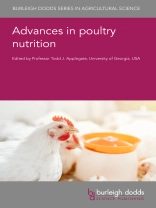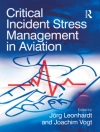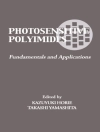- Reviews the development of novel feed sources as feed for poultry, focussing on the use of essential oils, macroalgae, microalgae and corn fermented protein
- Addresses the recent advances in understanding the role of individual nutrients and additives in poultry nutrition
- Considers the range of methods and techniques implementable to maintain the safety of poultry feed and prevent mycotoxin contamination
विषयसूची
Part 1 Physiology of feed intake
- 1.Nutrient requirements of broilers: an overview of factors affecting feed formulation: Gonzalo G. Mateos, Guillermo Talegón, Lewis Aguirre, Nereida L. Corrales, and Rosa Lázaro, Universidad Politécnica de Madrid, Spain;
- 2.Advances in understanding poultry digestive anatomy and physiology: Birger Svihus, Norwegian University of Life Sciences, Norway;
- 3.Digestive kinetics of feedstuffs in broiler chickens: Sonia Yun Liu, Shemil P. Macelline and Peter H. Selle, The University of Sydney, Australia;
- 4.Advances in understanding poultry feed intake regulation: Jalila S. Dridi, Université d’Orléans, France; and Sami Dridi, University of Arkansas, USA;
- 5.Advances in understanding the cellular basis of feed efficiency in poultry muscle: Walter Bottje and Kentu Lassiter, University of Arkansas, USA;
- 6.Genetic factors affecting feed efficiency in meat-type chickens: Samuel E. Aggrey and Romdhane Rekaya, University of Georgia, USA;
Part 2 Feed formulation
- 7.Maintaining the safety of poultry feed: G. Raj Murugesan, dsm-firmenich Nutritional Products, Switzerland; and Chasity M. Pender, dsm-firmenich Nutritional Products NA, USA;
- 8.Poultry feedstuff management and feed formulation utilizing big data: Bob Brill, Brilliant Alternatives Inc., USA; Matthew Clark, Feed Guys Resources Pte Ltd., Malaysia; and Dr Mirza Meghji, Salama Systems Inc., USA;
- 9.Advances in broiler breeder nutrition: Rick van Emous, Wageningen University, The Netherlands;
Part 3 Individual nutrients/additives
- 10.Advances in understanding and improving the use of amino acids in poultry nutrition: M. T. Kidd, University of Arkansas, USA; S. Y. Liu and P. Selle, The University of Sydney, Australia;
- 11.Advances in understanding and improving the use of enzymes in broiler nutrition: Tanner L. Wise, Jung Yeol Sung, and Olayiwola Adeola, Purdue University, USA;
- 12.Advances in understanding and improving the use of macro-minerals in poultry nutrition: the example of phosphorus: A. Narcy , BOA-INRAE-Université France; F. Hervo, BOA-INRAEUniversité de Tours, France and Université Laval, Canada; C. R. Angel, University of Maryland, USA; A. Bonadiman, Université Laval, Canada; M. Duclos, B. Méda and S. Mignon-Grasteau, BOA-INRAE-Université de Tours, France; M. Reis, Trouw Nutrition R&D – El Viso de San Juan, Spain; and M. P. Létourneau-Montminy, Université Laval, Canada;
- 13.The use of probiotics and prebiotics to improve gut function and immunity in poultry: unlocking the secrets of avian wellness: Guillermo Tellez-Isaias , University of Arkansas, USA; Daniel Hernandez-Patlan and Bruno Solis-Cruz, Universidad Nacional Autonoma de Mexico (UNAM), Mexico; Saeed El-Ashram, Kafrelsheikh University, Egypt; and Ebtsam Al-Olayan, King Saud University, Saudi Arabia;
Part 4 Novel feed sources
- 14.Emerging protein sources for poultry feed: Archibold G. Bakare, Fiji National University, Fiji Islands; Taiye Olugbemi, Ahmadu Bello University, Nigeria; Mohammed M. Ari, Nasarawa State University, Nigeria; and Paul A. Iji, Fiji National University, Fiji Islands and University of New England, Australia;
- 15.The use of phytogenics in optimizing gut function and health in poultry: Konstantinos C. Mountzouris and Ioannis Brouklogiannis, Agricultural University of Athens, Greece;
- 16.Using macroalgae/seaweed and microalgae in poultry feed: Elisabeth Baéza and Cécile Berri, INRAE Nouzilly, France; and Edouard Coudert, Roullier, France;
- 17.Advances in synthetic biology to improve poultry production: Emile Fierro-Morel, Annika Kirsten Madler, Xin Gen Lei, Cornell University, USA;
- 18.High protein corn fermentation products for poultry derived from corn ethanol production: Peter E.V. Williams, Fluid Quip Technologies, USA;
लेखक के बारे में
Dr Xin Gen Lei is Professor of Molecular Nutrition in the Department of Animal Science at Cornell University, USA. Professor Lei has an international reputation for his wide-ranging research in nutrition as well as algal biomass research. Amongst his many achievements, Professor Lei developed a new phytase enzyme that is now used in 46 countries to improve feed phosphorus bioavailability to animals and reduce their phosphorus excretion. He has won a number of awards from The American Society for Nutrition and the American Society of Animal Science. He is Associate Editor of the Journal of Nutrition as well as President of TEMA (Trace Elements in Man and Animals).












